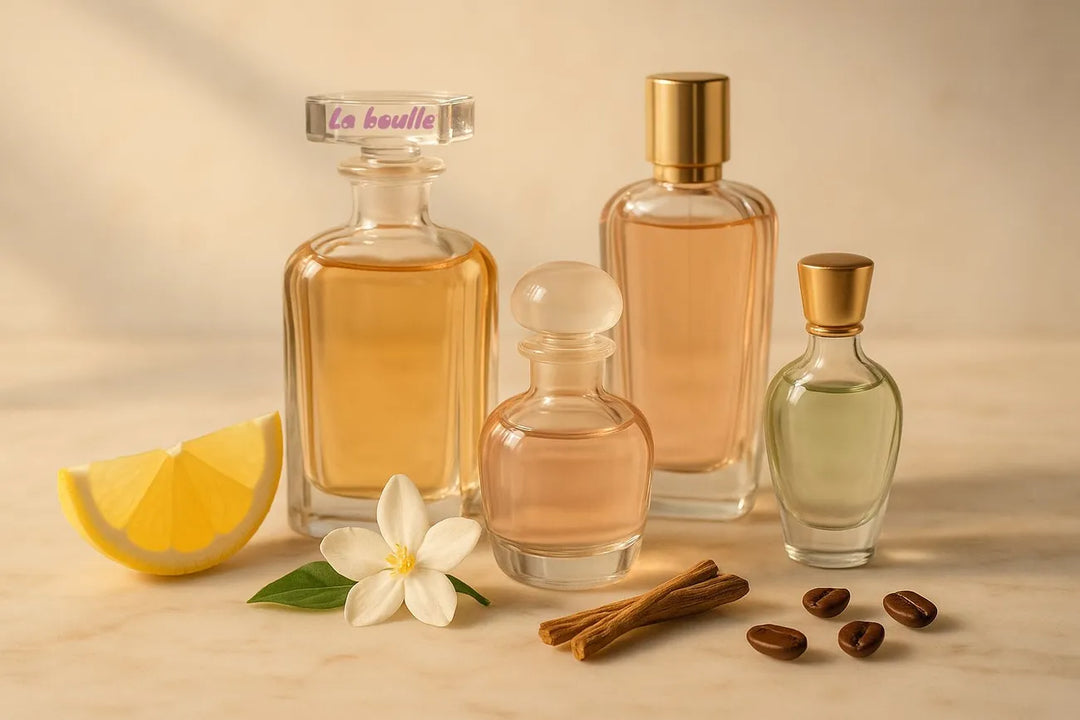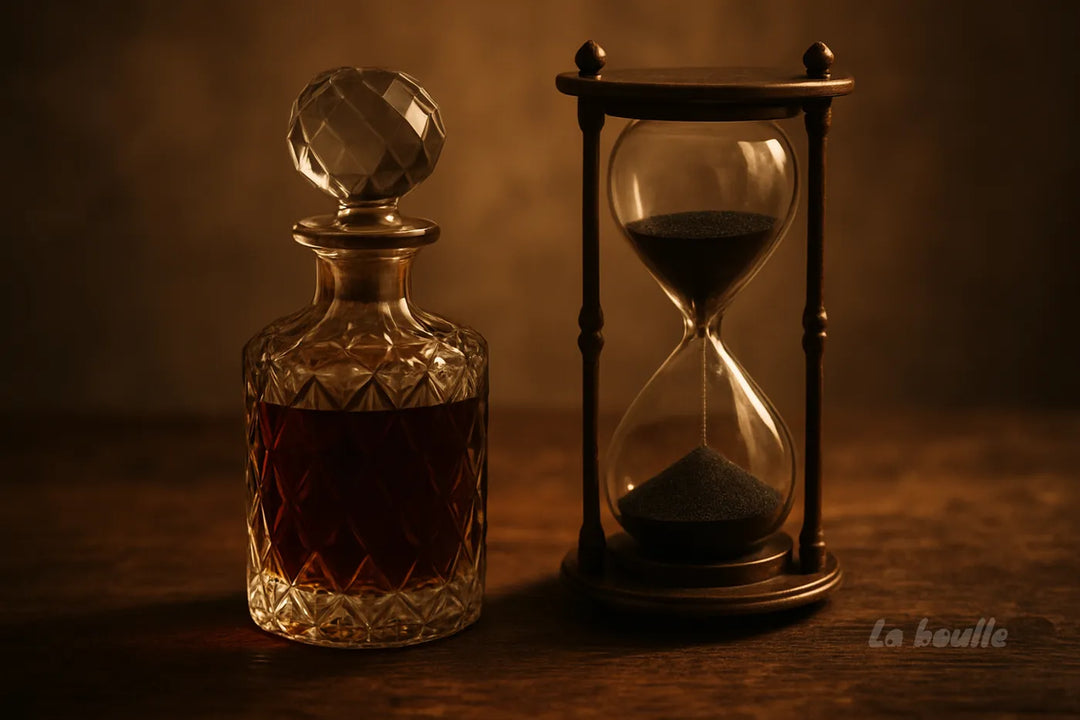Do Perfumes Expire? What You Need to Know Before Tossing a Bottle

Ever opened that bottle of perfume from your wedding six years ago and noticed it smells... off? You're not imagining it. Perfumes genuinely can expire, and when they do, the difference is impossible to ignore.
SUMMARY
-
Yes, perfume expires
-
How long does perfume last before it expires
-
How to tell if your perfume has expired
-
Is it dangerous to use expired perfume?
-
How to store perfume so it lasts longer
-
Are there perfumes that don’t expire quickly?
-
When to keep it, when to let it go
Yes, perfume expires. Here's why.
Whilst most bottles don't have an expiry date printed on them, that doesn't mean they last forever. A perfume is a complex blend of volatile compounds—some natural, others synthetic—that react with the air, light, and heat around them.
The process is called oxidation. The molecules in your perfume—particularly the aldehydes and esters that create those fresh, fruity top notes—begin to break down. Oxygen in the air alters their chemical structure. The result? The scent changes completely.
When a perfume is fresh, the top, heart, and base notes unfold in harmony. When it expires, that balance disappears. You're left with something sour, flat, or unpleasantly sharp.
How long does perfume last before it expires?
Most perfumes last between 3 and 5 years, but it depends on the composition and how you store them.
-
Citrus-forward perfumes or those with delicate top notes degrade faster. Limonene and linalool (found in lemon, bergamot, lavender) are extremely volatile.
-
Woody, musky, or amber-based perfumes last longer. Base notes—like sandalwood, musk, patchouli—are chemically more stable molecules.
-
Natural perfumes without synthetic preservatives can expire more quickly if not kept in ideal conditions.
A concrete example: a bottle of Chanel No. 5 from 2020, stored in the dark and kept cool, will smell nearly identical to a fresh one. The same perfume left on your bedside table near a window? Within two years it'll already have an altered scent—more alcoholic, less elegant.
How to tell if your perfume has expired
You don't need to be an expert. Here are the clear signs:
1. The scent has changed
If your perfume smells sour, metallic, overly alcoholic, or simply "wrong", it's likely oxidised. Top notes disappear first—which means that initial burst of freshness is gone.
2. The colour has darkened
A golden perfume turning dark brown? Clear sign of degradation. Oxidation changes not just the smell, but the visible composition as well.
3. The texture is different
Sediment, cloudiness, or oily separation? The formula is no longer stable.
4. Your skin reacts
If a perfume you've worn for years suddenly starts irritating your skin—redness, itching, burning sensation—stop immediately. Degraded ingredients can become irritating even for skin that isn't normally sensitive.
Is it dangerous to use expired perfume?
Not necessarily dangerous, but not recommended either.
Expired perfume isn't toxic in the classic sense. But broken-down ingredients can cause allergic reactions or irritation, especially for:
-
People with sensitive skin
-
Children
-
Pregnant women
If it smells fine and doesn't cause discomfort, you can continue using it—but watch for any signs that something's not right. Look after your skin. A dodgy perfume isn't worth the risk of a rash.
How to store perfume so it lasts longer
A few simple habits make the difference between a perfume that lasts 5 years and one that goes off in 2.
Keep it cool and dark
Sunlight and heat dramatically accelerate oxidation. Ideal storage: a drawer or wardrobe, away from windows.
Avoid bathrooms
Humidity and temperature fluctuations in bathrooms are perfume's worst enemies. Even if it seems convenient, don't keep your bottles there.
Keep it in the original box
The packaging isn't just aesthetic—it protects the bottle from light and thermal shocks.
Don't shake it and don't leave it open
Every time you open the bottle, oxygen gets in. Every shake mixes air into the formula. Minimise exposure.
Buy smaller sizes if you don't use it often
It's better to have 30ml that you'll finish whilst it's fresh than 100ml sitting on a shelf for 4 years.
Are there perfumes that don't expire quickly?
Yes. In fact, some perfumes can last for centuries.
The extraordinary case of ancient perfumes
Archaeologists have discovered perfumes in Egyptian tombs—some over 3,000 years old—that still retained their scent when the vessels were opened. Tutankhamun's tomb contained alabaster jars with fragrant unguents that hadn't completely lost their aroma. Roman perfumes from Pompeii, buried in volcanic ash for nearly 2,000 years, were still detectable.
What's their secret?
These ancient perfumes were oil-based, not alcohol-based. They contained stable ingredients like myrrh, frankincense, cedar, and nard, resins and essential oils that don't break down easily. They were stored in sealed vessels (alabaster, thick glass, ceramic) that prevented oxygen from getting in. And they were kept in stable, cool environments underground.
No oxygen. No light. No temperature fluctuations. Perfect preservation.
What this means for modern perfumes
The same principle applies today. Oil-based or solid perfumes are far more stable over time than alcohol-based sprays.
Alcohol evaporates and leaves the composition unbalanced. Oil and wax don't. That's why solid perfumes (like those from La Boulle and other natural brands) resist degradation better. The compact format also means less exposure to air.
Of course, you won't be storing your perfume in a sealed tomb for 3,000 years. But if you want something that lasts longer than the standard 3–5 years, oil-based formats are genuinely the way forward.
When to keep it, when to let it go
If a perfume still smells good, behaves normally, and your skin is happy—carry on using it without worry.
But if:
-
It no longer smells anything like it used to
-
It irritates your skin
-
It's been sitting unused for years
...then it's time to let it go. It's not wasteful—it's looking after yourself.
And when you're ready for something new, choose a perfume you'll actually wear. Something that makes you feel good now—not in 5 years' time.
Frequently Asked Questions
Can perfume really expire?
Yes. Oxidation and ingredient degradation change the scent and stability. Even if it's technically still "safe", the olfactory experience is compromised.
How do I know if my perfume has gone off?
Changed smell (sour, flat, sharp), darkened colour, altered texture. If it irritates your skin, stop using it immediately.
Is it safe to use expired perfume?
It depends. If it smells normal and doesn't irritate, probably yes. But if you have sensitive skin or notice any reaction, replace it.
How long does perfume usually last?
3–5 years, depending on composition and storage. Citrus-heavy and natural scents expire faster.
Do solid perfumes expire?
Yes, but more slowly. Without alcohol and with a compact formula, they resist oxidation better.
Dorin Epureanu, Perfumer La Boulle








